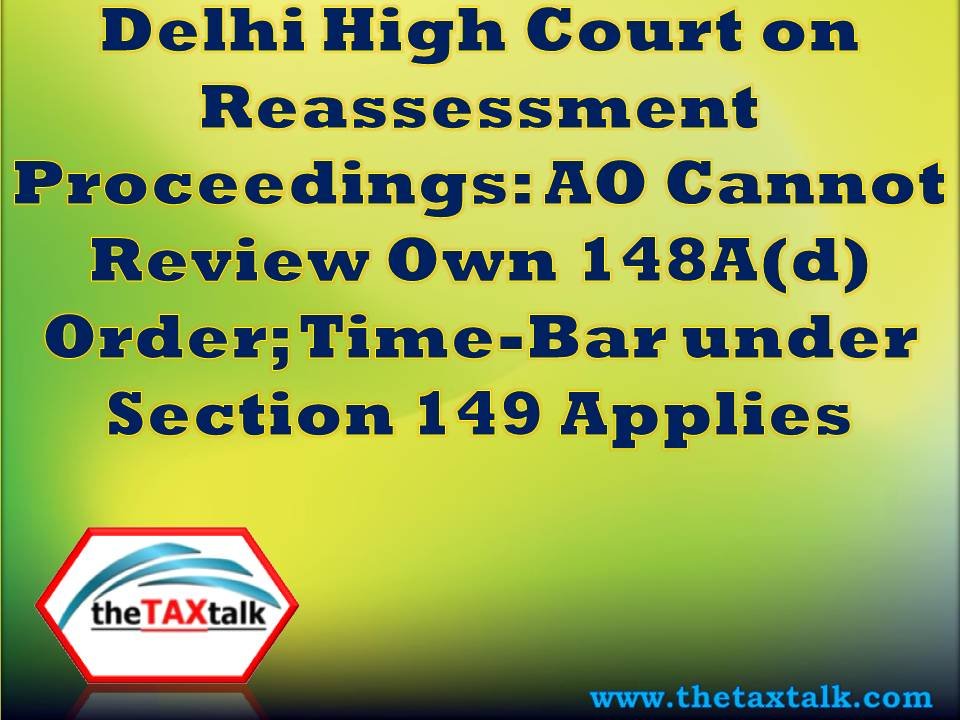![]()
Delhi High Court on Reassessment Proceedings: AO Cannot Review Own 148A(d) Order; Time-Bar under Section 149 Applies
The recent decision of the Delhi High Court in the case of Baba Global Ltd. vs. Assistant Commissioner of Income-tax ([2025] 176 taxmann.com 466 (Delhi), dated 7 July 2025) addresses two pivotal issues in reassessment proceedings under the Income-tax Act, 1961: the power of the Assessing Officer (AO) to review or revise his order under section 148A(d) and the strict time limits for issuing reassessment notices under section 148, as governed by section 149.
Background and Key Facts
The assessee, Baba Global Ltd., filed its return for Assessment Year (AY) 2019-20.
On 31 March 2023, the AO issued a show cause notice under section 148A(b), alleging disproportionate foreign remittances relative to the income declared.
The assessee explained the transactions in detail, clarifying remittance years and supporting documentation.
After considering the reply and available data, the AO passed an order under section 148A(d) on 27 April 2023, accepting the explanation and dropping the proceedings.
Subsequent Reversal & Reassessment Notice
After passing the order dropping proceedings, the AO apparently noticed that his order was inconsistent with the prior approval obtained from the Principal Commissioner of Income Tax (PCIT) for issuing a notice under section 148.
On 28 April 2023, the AO reversed his earlier position, issued a new order under section 148A(d), and served a notice under section 148, initiating reassessment.
Legal Issues Considered by the Court
Can the AO ‘Review’ or ‘Reverse’ an Order Passed under Section 148A(d)?
The Court held that the AO, once having passed an order under section 148A(d) dropping reassessment, cannot subsequently revise or review that order merely because it differs from the PCIT’s approval. The law does not provide the AO with the power to review a concluded order under section 148A(d).
The Court distinguished this situation from a mere rectification of clerical errors, noting that the AO’s second order was a clear reversal of the reasoning and conclusion, not just a correction.
Limitation for Issuance of Notice under Section 148 – Application of Section 149
The law prescribes a strict time limit—the last date for the AO to issue a notice under section 148 for AY 2019-20, after considering the exclusions/extensions provided in the fifth and sixth provisos to section 149(1), expired on 27 April 2023. The AO’s notice dated 28 April 2023 was, therefore, barred by limitation and without jurisdiction.
The plea by the department that the second order and notice were mere corrections could not extend or revive the expired limitation.
High Court’s Ruling
The procedure adopted by the AO in ‘reviewing’ and reversing his earlier order under section 148A(d) was held to be contrary to law.
The notice under section 148 having been issued beyond the prescribed limitation period was declared invalid.
Both the impugned order and the subsequent reassessment notice were set aside in favour of the assessee.
Significance for Taxpayers and Practitioners
This ruling clarifies that the quasi-judicial powers conferred on the AO under section 148A(d) do not allow for multiple or sequential decisions in respect of the same issue.
The limitation period set by law under section 149 is sacrosanct and cannot be circumvented, even where ‘approval’ from higher authorities exists.
Taxpayers who receive reassessment notices in similar circumstances-especially where an AO seeks to revisit a concluded 148A(d) order or where notices are issued post-deadline-may rely on this decision for appropriate relief.
For further details, readers may refer to [2025] 176 taxmann.com 466 (Delhi) and relevant provisions of the Income-tax Act, 1961.
The copy of the order is as under:


